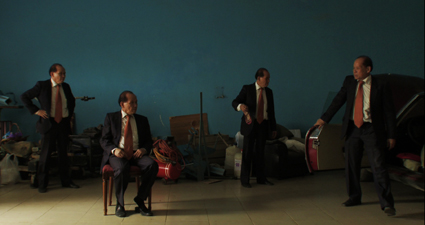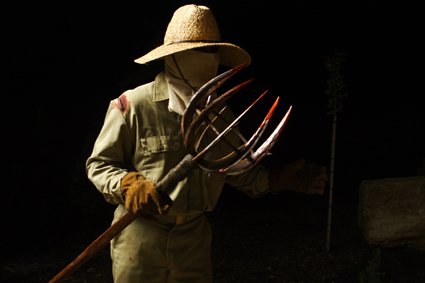reading the signs, seeking revelation
travis johnson: jack sargeant, revelation, perth international film festival

Golden Slumbers
NOW IN ITS 15TH YEAR, PERTH’S PREMIER FILM FESTIVAL SHOWS NO SIGNS OF SLOWING DOWN. FESTIVAL DIRECTOR JACK SARGEANT EXPLAINS HOW THE REV MANAGES TO COMBINE THEMATIC SOPHISTICATION WITH ITS RENOWNED YOUTHFUL SWAGGER.
As the festival’s July start date draws closer, Sargeant acknowledges that he is still under the gun, dealing with the staggering number of submissions that Revelation receives. “This year I’ve chased down three or four hundred movies,” he estimates. “And we get submitted I don’t know how many hundreds that Richard (Sowada, Revelation founder, now working at Melbourne’s ACMI) and I wade through. It’s pretty mammoth. Rev seems to grow exponentially each year—there’s just more and more happening.”
But while Sargeant eschews the notion of selecting films for the festival based on a preconceived overarching theme, he will concede that a dominant throughline does tend to form as choices are made and the pile of hopefuls is winnowed down. “It works out that we have got a theme this year,” he says. “Well, actually, there are two: community and family. But you don’t look for things—these things just start emerging.”
It’s a fitting theme. Revelation is, after all, one of the key events on the Western Australian film community calendar. Inaugurated in 1997 as a showcase for a handful of independent shorts, it now encompasses a program in excess of 100 films and attracts a large number of international guests. It could easily be argued that the notion of community is present every year, inasmuch as the festival acts as a hub for the Perth film scene.
Rev in 2012 boasts a notably strong documentary stream. “This year we’ve got a lot of documentaries,” Sargeant says. “I think 15 or 16 documentaries at this point. Documentaries are really on the ascendant. I don’t think we’ve seen any ‘Occupy’ documentaries, but we are seeing a shift away from environmental stuff to economic and political stuff coming in. I think we’re seeing a shift in film in that direction.”
Davy Chou’s Golden Slumbers stands out as a powerful example. A haunting examination of the decimation of the Cambodian film industry under Pol Pot’s regime, Sargeant describes it as “an incredibly moving documentary, because obviously most of [the filmmakers] were murdered under Pol Pot in the mid 70s. There’s literally only a half dozen or so of those filmmakers left, and they just talk about the industry. You get a sense of this incredibly vibrant community, but now there are only five or so films dating from that period left. They made hundreds and hundreds of films, and now there are only five. But Golden Slumbers will, I imagine, soon be playing everywhere; it’s an incredibly powerful movie.”
Another film which will no doubt reach a much wider audience before long is Undefeated, the American sports documentary by Daniel Lindsay and TJ Martin. A look at a year in the life of the Manassas Tigers, a woefully underfunded and ill-equipped high school football team who attempt to reverse a century-long losing streak, the film won the 2011 Oscar for Best Documentary, and should hold the same crossover appeal as Steven Riley’s Fire in Babylon, the film on the West Indies cricket team of the 70s which opened last year’s festival.
“We’ve also got a film called Battle For Brooklyn,” Sargeant continues, “which is about a whole community in New York fighting against their neighbourhood being demolished to make way for a stadium and blocks of designer flats. It’s a very interesting documentary going towards that notion of community that I was talking about.”
That theme carries over into the festival’s fiction stream as well, with the Australian horror film The Caretaker, from first-time feature director Tom Conyers. The film postulates a discordant community of necessity that emerges when a disparate group of strangers hide out in a rural mansion after a plague of vampirism sweeps the globe. Matters are complicated when they must strike a deal with a vampire, played by producer Mark White, who also dwells in the mansion. Having already drawn acclaim on the North American festival circuit, it will make its Australian premiere at Revelation.

The Caretaker
Unusually, The Caretaker was one of only a few horror films submitted to the festival. “Normally we’re inundated with average to fair films made by people about chainsaws and zombies, and there’s actually very little of that this year,” says Sargeant. “I don’t think horror’s going away, but I think it’s changing. It’s getting kind of absurd right now. I was joking with somebody the other day that sooner or later you’re going to get a found footage horror film that’s shot in 3D. Horror has become so self-referential. So we’re seeing less horror.” However, Sargeant maintains that it’s the shifting genre landscape that makes programming a festival like Revelation so challenging and rewarding.
“You can see change happening slowly in film.” he says thoughtfully. “The big secret of programming cinema is that you’re not just curating films, you’re curating the relationships between the films. Once you start programming, you start thinking about how the films will work together, because you have to go forward on the assumption that people will see more than one film. Also, you don’t want to define yourself too rigidly or lock yourself into too small a place. The whole curatorial process is a really interesting one. On a personal level, I think you should always be pushing yourself and looking in different places for things that will pique your interest. We’re always looking for new things that are out there—you have to do that.”
Revelation Perth International Film Festival, The Astor Theatre, Perth, July 5-15, www.revelationfilmfest.org
RealTime issue #109 June-July 2012 pg. 15






